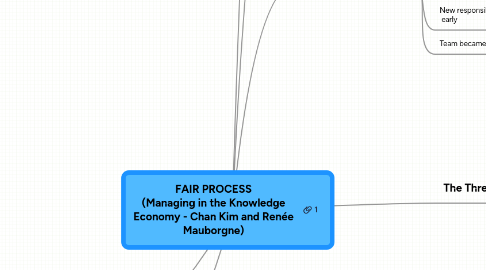
1. Untitled
1.1. New Topic
2. Two Complimentary Paths to Performance (click to expand)
2.1. click to expand
2.2. Distributive Justice
2.3. Procedural Justice
3. Basic
3.1. Process that increases employees commitment to management decisions - even when there is disagreement on what is the 'best' decision
3.2. Merit of ideas, not consensus, drives decision making
3.3. IS NOT
3.3.1. IS NOT harmony or support through compromises
3.3.2. IS NOT same as democracy in the workplace
3.4. Human Need
3.4.1. Human Being
3.4.2. Not 'Personnel' or 'Human Assets'
3.4.3. Respect of people's intelligence
4. The Three Principles
4.1. Engagement
4.1.1. Input from Individuals
4.1.2. Refutation
4.1.3. Respect
4.1.3.1. Individuals
4.1.3.2. Ideas
4.1.4. Collective Wisdom
4.1.5. Leads to
4.1.5.1. Better Decisions
4.1.5.2. Commitment
4.1.5.3. Better Execution
4.2. Explanation
4.2.1. Understanding the WHY
4.2.2. Opinions considered
4.2.3. Impartiality
4.2.4. Trust managers intentions
4.2.5. Feedback loop -> learning
4.3. Expectation clarity
4.3.1. State clear rules of the game
4.3.2. Explain
4.3.2.1. Standards for judging people
4.3.2.2. Penalties for failure
4.3.3. Clear understanding is KEY
4.3.3.1. New targets, milestones
4.3.3.2. Who does what?
5. EXAMPLE (BAD) Good Outcome, Unfair Process
5.1. Team was: HIGH PERFORMANCE
5.1.1. Good Knowledge
5.1.2. Enthusiasm
5.2. Diminished demand on product
5.3. New Work Process
5.4. Outside Consultants
5.5. No engagement
5.5.1. 'minimal disturbance'
5.6. Notes and fancy diagrams
5.7. Rumors
5.8. Announcement
5.8.1. No explanation on WHY
5.8.2. Expectations not explained
5.9. Lack of trust
5.9.1. Process
5.9.2. Management
5.10. Team became: LOW PERFORMANCE
5.10.1. Teams falling apart
5.10.2. Refusing work
5.10.3. Poor trust/communication
5.10.4. Confusion
5.10.5. Unclear on how to succeed
